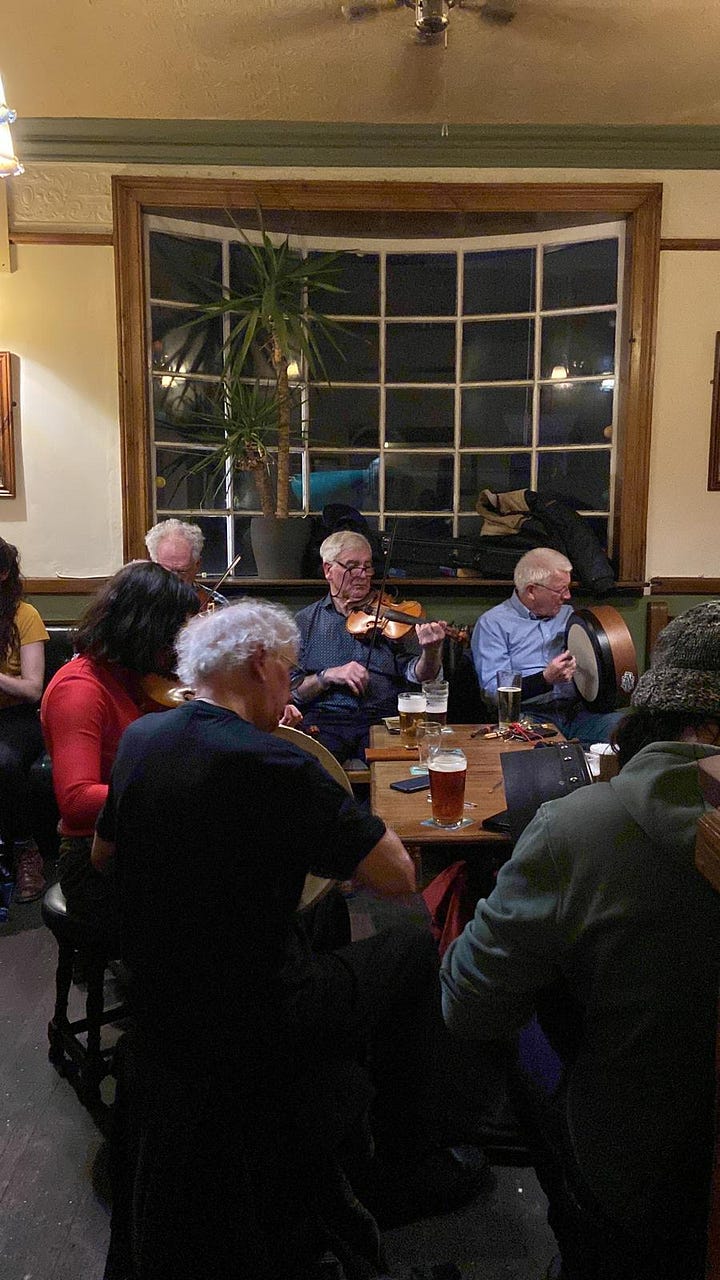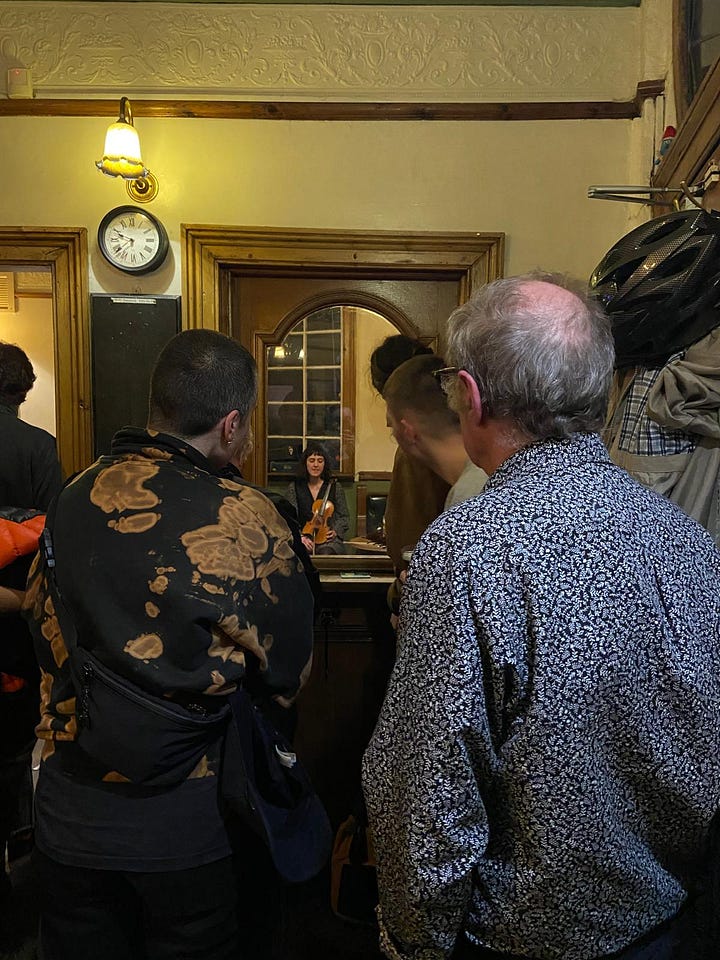“I do think,” posits Uilleann pipes player Ellen McGovern, “that sometimes people come over to Liverpool expecting a good Irish scene, they’ll see the Celtic Corner, and they’ll write it off.”
“Not to be snide,” she quickly clarifies, “it's just that if you’re expecting sessions, you’re not going to find them there. But there's Facebook groups, there's pubs... All sorts, really, left, right, and centre, that are still keeping the music going.”
Still going, yes, but more recently, it feels like there’s a new session springing up every other week. For all the Irish history in this city, are we witnessing something remarkable in the resurgence of traditional Irish folk?
As Ellen well knows. When she arrived in Liverpool back in 2018, there were perhaps four sessions a week. But just six years later, there’s one almost every night. She was invited to start a new one at the Green Man on Lark Lane earlier this year. Within just a few months, that turned out to be so successful that she’s now hosting another on a Tuesday night at the sister pub, the Red Lion on Slater Street.
As one regular session player eloquently put it, “There’s no excuse to sit on your arse in Liverpool!”
Sessions (or seisiún) are informal gatherings of musicians, most typically in an old-timey pub, to play Celtic music, largely from Ireland. Anyone can take advantage of a lull in the music to start up a fresh tune, and those who know it (or want to give it a go) are tacitly invited to join in.


“The lovely thing about it,” Mike Hogan, a flute player, explains, “is that you’re meeting new musicians all the time, and through that, you also hear the new tunes that they’re playing; it keeps everything growing and dynamic.”
Mike’s been playing at the Monday session at the Edinburgh (L15) for almost all of 18-year history “-apart from the pandemic and a couple of times for family reasons, it’s just been a fixture in my life,” he interjects.
When Ellen explains what makes sessions so different from gigging or jamming, it's the “complete spontaneity” that stands out: “there’s no planning on what tunes we're going to play. There's no arranging... you know, we don't even know who's going to turn up that day.”
There’s a fluid structure that’s integral to the sessions. Anyone can join in on the music at any time or seize an opportunity to start off a tune they want to throw into the mix.
And then there’s the context of the pub. This isn’t about gathering to get blathered, but more about a community coming together in a (to use the fashionable term) ‘third space' - a 'reminder of ‘a quick half down the local’ days of yore, perhaps.
In fact, along the grapevine, we hear that some of the city's pint-pullers are themselves quite happy about the growing enthusiasm for folk, finding that it can sometimes keep a rowdier night at bay as punters are content to sit and soak it all in while nursing a pint or two.
“A key thing,” Ellen adds, “is that even if you don’t play, you’re more than welcome to sit and listen. We like it when people sit and listen. It's not weird; it's not uncomfortable. We're kind of just in our zone, and the fact that anyone else is appreciating it is a bonus.”
No matter the level of experience of the musician, most are there simply to play. Mike recalls his first experiences listening to trad sessions in tiny villages in Ireland with ‘phenomenal musicians’, who had gathered casually to play. Talk to the crowd at a session, and you’ll quickly find a vast range of levels and styles – but that’s part of the appeal.
For some, regular appearances at sessions are a way to practice. While the thought may seem daunting, in a room full of musicians, you can’t go back and correct a mistake; everyone else has moved on, and the chances anyone notices are slim to none. Instead, you’ve just got to get right back on the musical horse and join in again when you can.
Each session across the city has a unique style, lightly shaped by the hand of the implicitly recognised session leader.
“I think it’s class,” surmises the ever-knowledgeable Ellen, “the variety of styles and the fact that it’s coming back in Liverpool.”
From the most trad of trad to the more experimental side of things, the diversity means that, far from being in competition with one another, the many sessions cropping up across the city collectively weave a rich tapestry of folk in Liverpool.
The deep-rooted Irish history in Liverpool is news to no one - in fact, talk to some of the regulars at any given session, and they’ll be able to talk to you for hours about the music and dances at Liverpool Irish Centre back in the day. But with the centre moving from Mount Pleasant in the 1990s, many younger attendees struggle to remember ever hearing Irish music in the city centre.
That’s starting to change, and traditional Irish folk is once again on the streets.
Well, many will argue that it never really went away, but it’s certainly more in your face these days, particularly with Ellen’s new session on a Tuesday night at the Red Lion. Right in the city centre, it’s drawing a new, often younger, crowd whose interest is piqued by the sound of live music spilling out of the pub as they meander down Slater Street after a few midweek pints.
Mike’s been playing for over half a century – ever since picking up a traditional wooden flute at age 19 after a camping trip to the west coast of Ireland, during which his idea of pub music was totally turned on its head. He’s noticed an uptick in younger people and students turning up at local sessions recently.
Perhaps it’s a direct consequence of the inconspicuous, yet definite, wave of popularity that folk music, in its broadest sense, is enjoying more broadly across the UK. The last few months alone have seen folk artists that constitute part of this wave playing in Liverpool at a range of venues, from Future Yard to the Philharmonic and north docks staple Quarry; some of these have been so well attended as to earn the title ‘nature’s sardine can’.
It’s a theory that the tentative questioning of a mid-twenties first-timer at the Monday-night Edinburgh session might support.
“Do you play any bluegrass tunes?”
“Different universe,” comes the response, “but we’d love to hear a tune if you know one!”
That openness to hearing other tunes and getting fresh faces involved is reaffirmed a few weeks later when a Greek lament is introduced into the mix. Irish trad may be the bread and butter, but curiosity and enthusiasm for folk writ large abound.
Beyond the current vogue (of sorts) of folk, there’s also the fact that sessions are inherently communal events. After a few years of social isolation coupled with longer trends of alienation facilitated by digital interactions, the cost of going out, and the erosion of third spaces, sessions may offer a shared experience that many of us are craving.
Whether trad or fusion, folk is back. It’s time to get onboard.
Get down on it:
13/06 - Oddissee (Future Yard)
15/06 - Richard Hawley (Olympia)
16/06 - PalAction Fundraiser (Quarry, donation OTD)
19/06 - Ensemble 10:10 (The Phil)
19/06 - Courtney Barnett (Arts Club)
19/06 - Andrew Nolan w/Knifedoutofexistence & Cromlech (Quarry - RA, Fatsoma)
On repeat this week:
Waxwing (Loris and the Lion, Bandcamp)
Take You To Sleep - Live at The Minack Theatre (This Is The Kit)
Agir Roman (Cüneyt Sepetçi)
Rockaway (Joshua Lee Turner)



